The world’s favorite superfood, kale is a popular dark, leafy green vegetable that needs to be part of your diet. The cruciferous vegetable, coming from the same family as cabbage, cauliflower, and broccoli, has been featured of plates for centuries and it’s a great way to give your body a dose of essential nutrients, minerals, and vitamins.
What are the different types of kale?
You’ll be happy to know that kale comes in different forms, and flavors, making the vegetable a great addition to any meal. The different types of kale include:
– Curly kale: The most common type of kale, available in purple, and dark and bright green. As mentioned in its name, curly kales have curly edges that are easy to tear off.
– Red kale: With leaves that have a reddish tinge, and slightly purple stalks, red kale is regularly used in salads.
– Lacinato/dinosaur kale: With its scaly texture, hence the name, dinosaur kale is firmer and less bitter than curly kale, with dark blue-green leaves that are not only longer and flatter but they also maintain their texture after cooking.
– Baby kale: As said in the name, baby kales have young tender leaves. 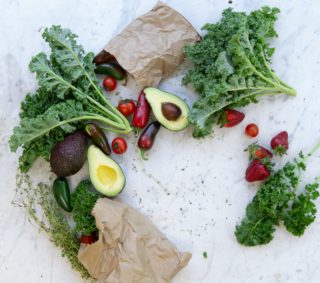
– Purple flowering kale: Possesses a bitter taste.
– White flowering kale: Possesses a peppery taste.
It’s packed with nutrients
As mentioned, kale is incredibly rich in a number of nutrients. In fact, it’s one of the most nutrient-dense foods in the world – no wonder it provides so many health benefits.
The vegetable contains high amounts of antioxidants and vitamins A, C, and K. It also, per calorie, contains more iron than beef. Kale also holds omega-3 fatty acids, B-vitamins, potassium, calcium, fiber, magnesium, manganese, copper, and phosphorus.
What are the health benefits?
1. It can help your heart
Regularly eating kale can help to improve your heart health, and even reduce the risk of heart disease.
For one, the vegetable contains both omega-3 and omega-6 fatty acids, and the latter has been found to improve heart health (1)
Secondly, it’s also a great source of potassium and this nutrient is beneficial for heart health. This is because potassium can help to lower blood pressure, as well as significantly reduce the risk of heart disease.
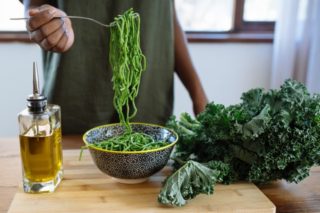
Photo by Retha Ferguson from Pexels
Lastly, kale can also help to regulate cholesterol levels. High levels of LDL (bad) cholesterol and low levels of HDL (good) cholesterol can greatly increase the risk of heart disease and heart attack. However, according to a study published in Nutrition Research, the fiber found in steamed kale helped to remove LDL cholesterol from the body. Additionally, a separate study done on men with high cholesterol found that drinking kale juice every day for 12 weeks increased HDL cholesterol by 27% and lowered LDL levels by 10% (2).
2. It can help manage and reduce the risk of diabetes.
As mentioned, kale contains fiber and research has found that a diet high in fiber helps to reduce the risk for diabetes.
Additionally, it also contains manganese and this nutrient can help to reduce insulin resistance, making it a great tool to prevent as well as manage type 2 diabetes.
3. It can help with digestion
Kale contains fiber, and as most of us know, this is great for helping with digestion.
However, what we may not know is that the vegetable’s stems contain prebiotics, and this not only supports gut health, but it also supports digestion. Kale stems may not sound appetizing, but after being sautéed, they make quite the snack.
4. It may help reduce cancer risk
Kale is a member of the cruciferous vegetable family, and this family of vegetables has been found to contain natural compounds that can help to significantly lower the risk of several cancers. Not to mention, it’s also rich in antioxidants, and this is often the best defense against the development of cancer. 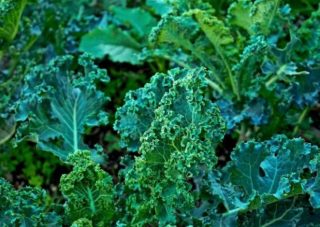
The vegetable contains high levels of properties called glucosinolate phytonutrients. According to a study published in the Molecular Cancer Journal, a compound known as sulphorophane glucosinolate helped to inhibit growth in ovarian cancer cells. Additionally, an animal study published in the Carcinogenics journal found that glucosinolate found in large amounts in kale helped to prevent the spread of bladder cancer cells.
5. It can help protect brain health
Kale contains iron and omega-3 fatty acids, both of which can help protect brain health.
Iron plays a pivotal role in the transportation of oxygen to the body’s cells, which is important for muscle and brain health. In regards to brain health, omega-3 fatty acids help with cognitive functions such as memory and performance.
Additionally, an article published in Neuroscience Letters, shared that sulphorophane, an antioxidant found in kale, may help with brain function, especially after brain injury.
6. It can help keep your bones happy
We all know that we need calcium to keep our bones healthy, and you’ll find plenty of it in kale. In fact, according to the American Journal of Clinical Nutrition, one cup of cooked kale has about the same amount of calcium as one cup of cow’s milk. Also, calcium isn’t just needed for bone health. Calcium is also used for other body processes such as cell signaling and helping blood vessels transport blood through the body.
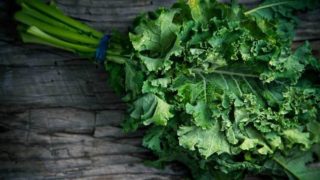 It’s not just calcium that helps to keep your bones healthy. Vitamin K also helps to support bone health by improving bone density and reducing the risk of fractures (3). Considering kale is a top source of vitamin K, it’s safe to assume that eating more of it will help make your bones happy.
It’s not just calcium that helps to keep your bones healthy. Vitamin K also helps to support bone health by improving bone density and reducing the risk of fractures (3). Considering kale is a top source of vitamin K, it’s safe to assume that eating more of it will help make your bones happy.
7. It can anti-age your skin
The vitamins found in kale are the perfect vitamins you need for smooth and flawless skin.
For one, the vegetable contains vitamin A (retinol), a compound regularly used as an ingredient in a number of anti-aging products and treatments. Vitamin A encourages healthy cell growth, this can help to alleviate the signs of aging such as wrinkles and pigmentation. It also helps to keep your hair healthy.
Kale also contains vitamin C, and this compound helps to encourage the production of collagen. In doing so, it helps to keep the skin supple, and it also alleviates the appearance of scars, wrinkles, and pigmentation.
In addition, kale contains iron and as iron deficiencies can cause hair loss, the iron found in kale may help to maintain healthy hair.
8. It protects your vision
Two of the antioxidants found in kale can help to keep your eyes healthy and reduce the risk of vision loss in the future.
Lutein and zeaxanthin are carotenoid antioxidants that maintain healthy eye cells, and they’ve also been found to lower the risk of eye disorders, particularly macular degeneration and cataracts (4).
Are there any risks?
In some cases, if eaten in high amounts, kale can affect interaction with the thyroid. Therefore if you have a thyroid disorder, such as hypothyroidism, it would be advisable to speak to your doctor about which foods you should avoid.
Also, kale is a common fixture on the Environmental Working Group’s “Dirty Dozen” list, so it’s important to always opt for organic kale if possible and to thoroughly wash what you do buy. 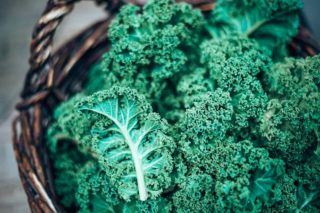
Cooking with kale
It’s been shown that cooking the vegetable may affect its nutritional value so, if you’re not a fan of raw kale, it would be better to steam the vegetable instead.
If you’re not sure where to start, here are some of our favorite recipes:
Soft Polenta with roast squash, kale & hazelnuts
Turkey, Kale and Brown Rice Soup
Kale chips
Kale and Sweet Potato Sauté
5 Ingredient Healthy Kale and Quinoa Bowl
References
Arup B., Li T., Yun L., Feng G., et al. (2010). https://doi.org/10.1093/carcin/bgp303
Bryant, C.S., Kumar, S., Chamala, S. et al. (2010). https://doi.org/10.1186/1476-4598-9-47
Dash, P. K., Zhao, J., Orsi, S. A., Zhang, M., & Moore, A. N. (2009). https://doi.org/10.1016/j.neulet.2009.04.028
Hao, G., Zhang, B., Gu, M., Chen, C., Zhang, Q., Zhang, G., & Cao, X. (2017). https://doi.org/10.1097/MD.0000000000006725
Harris, W., Mozaffarian, D., Rimm, E., Kris-Etherton, P., et al. (2009). Omega-6 Fatty Acids and Risk for Cardiovascular Disease: A Science Advisory From the American Heart Association Nutrition Subcommittee of the Council on Nutrition, Physical Activity, and Metabolism; Council on Cardiovascular Nursing; and Council on Epidemiology and Prevention. Circulation. 119. 902-7. 10.1161/CIRCULATIONAHA.108.191627.
Lanou, A., (2009). https://doi.org/10.3945/ajcn.2009.26736P
McRae M. P. (2018). https://doi.org/10.1016/j.jcm.2017.11.002
Soo Y.K., Sun Yoon, Soo M.K., Kye S.P., Yang C.L.,(2008). https://doi.org/10.1016/S0895-3988(08)60012-4.
Talwinder S.K., Mei-Chen M.C., Mary H.C.(2008). Steam cooking significantly improves in vitro bile acid binding of collard greens, kale, mustard greens, broccoli, green bell pepper, and cabbage, Nutrition Research, Volume 28, Issue 6, Pages 351-357, ISSN 0271-5317,https://doi.org/10.1016/j.nutres.2008.03.007.


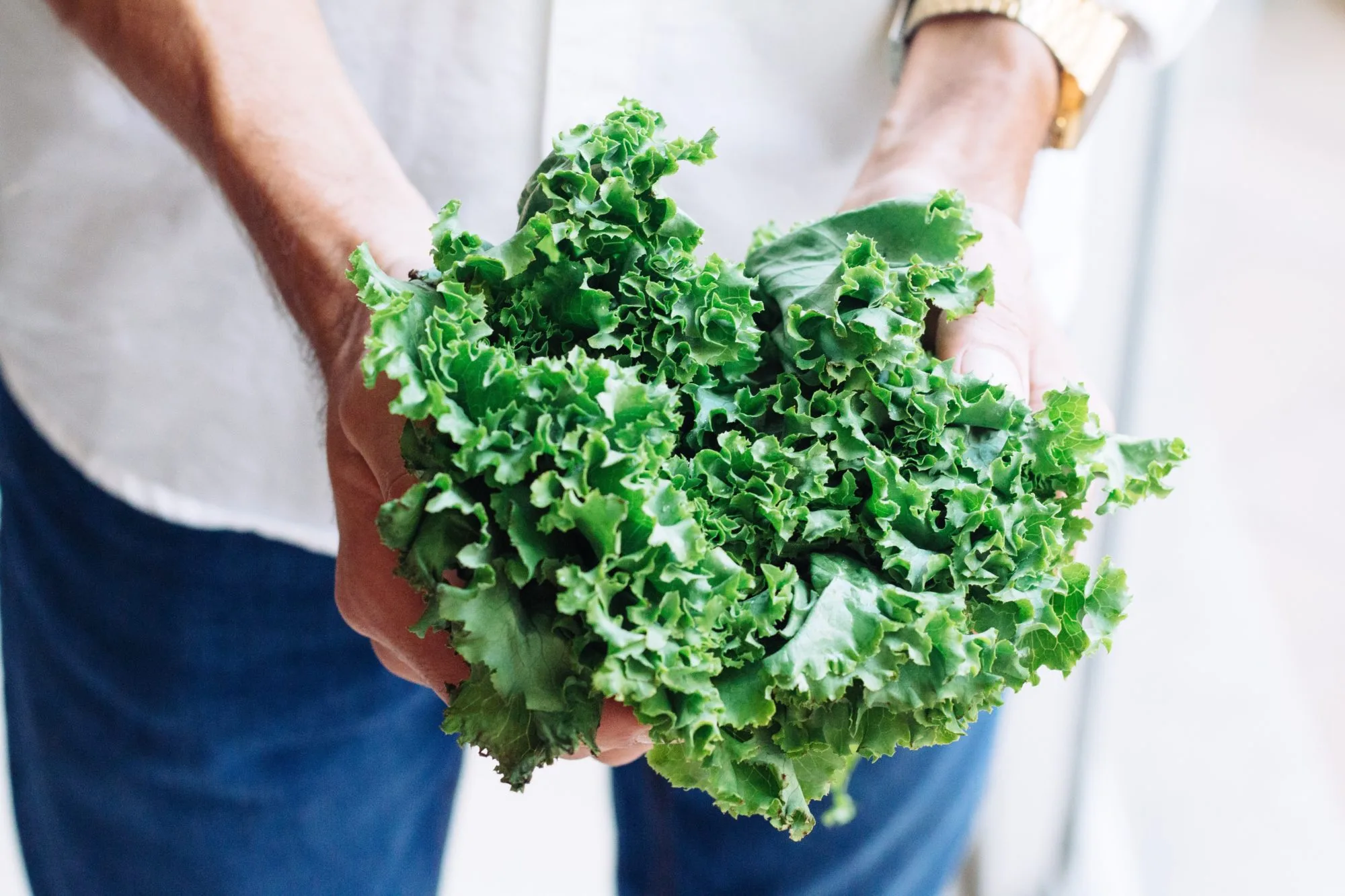


![women [longevity live]](https://longevitylive.com/wp-content/uploads/2020/01/photo-of-women-walking-down-the-street-1116984-100x100.jpg)











4 Comments